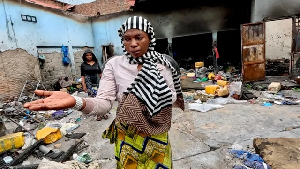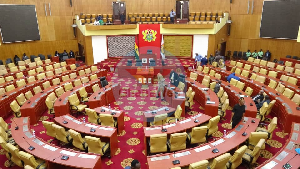Tamale, March 18, GNA - A book, "Kadi, the barefoot girl" designed to expose poverty and challenges girls face in rural communities has been launched in Tamale with a call on Ghanaians to cultivate the habit of reading and story telling in their local languages to address educational lapses. The 128-page book tells the story of a poor girl (Kadi) in a rural community called Kukula in the Kassena Nankana District of the Upper East Region, where access to education is under a baobab tree and change of lessons was done according to the direction of the sun's shadow. The author, Santua Niagia, a journalist also tells the story of the ordeals and deprivation girls go through in the northern setup and painted pictures of both gloom and brighter future for the citizens of that place depending on their determination to shine. Professor John Kaburise, Vice Chancellor of the University for Development Studies (UDS), speaking at the launching ceremony in Tamale at the weekend described the book as a literally device meant to change the attitude of the northern inferiority complex. He said the book though fiction depicted real life situations in rural communities in the Kassena Nankana areas and that it was necessary for the book to be recommended to schools so that the rest of the country would understand the problems confronting education in the North. He advised Ghanaians to refocus attention on telling their children fairy tales in their local dialects and in English to improve the standard of oral English language in the country. Prof. Kaburise commended Santua Niagia for his painstaking research on the subject matter and settings in the book and called on other northern scholars to do well to project the north for development. Dr Agnes Apusiga, a lecturer at UDS, who reviewed the book described it as a masterpiece, which every girl needed to read to spur them on to develop their potentials in life. She said the book focused primarily on rural living and female experiences within a northern context and that the author also painted pictures of familiar and believable events in the north. Dr Apusiga said the book was very useful in Ghana's educational curricula and could serve as an interesting reader for schools in their language classes particularly those in the northern sector. Mr. Santua Niagia, the author said he drew the inspiration to write the book from the fact that he gained a lot of experience staying in a rural community and in the cities and the gap between the two was very wide and needed to the tell the story in a book form. He said the situation in Kukula as depicted in "Kadi, the barefoot girl" was not different from many rural communities in the entire West African sub-region and that it needed the support of all to ensure that the plight of rural dwellers was alleviated. The first ten copies of the book were auctioned at 32 million cedis with the first copy being sold at five million cedis.
Entertainment















